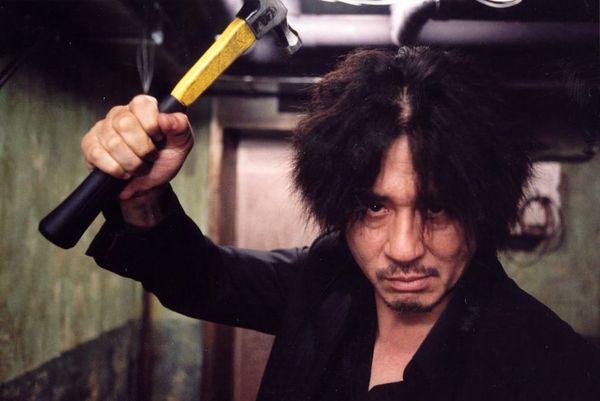Eye For Film >> Movies >> Oldboy (2004) Film Review

Winner of the 2004 Grand Jury Prize at Cannes, yet best known in the west for the controversy surrounding a scene in which a live squid is eaten (four were used during filming), Old Boy is an intense, complicated thriller showcasing some of the greatest talent in Korean cinema today. Faster paced than Park's previous work, it nevertheless needs two hours to tell its tangled tale. Along the way, we encounter all the stylised violence and passionate sex which would be expected in such a work, yet there's something much cleverer going on here, as these elements are woven into an unexpectedly potent, morally challenging whole.
Seeming several times as if it will turn into a different kind of film altogether, Old Boy opens with a wild-eyed man suspending another man against the edge of a roof by his tie. Is he there to kill him, or to save him? He hesitates in recalling his own name, Oh Dae-su, which means 'gets along well with others'. This name is of great importance to him, as it is one of the few things he has left, the only constant element of his identity.

Travelling back in time, we see Dae-su drunk in a police station, annoying the staff, waiting for his best friend to come and take him home. As they make their way back, Dae-su goes missing, and his friend is frantic. We next see Dae-su in the room where he is being kept prisoner after having been mysteriously kidnapped. He has a televsion to tell him of external events. He is given food and medical treatment, and is looked after, but he cannot escape, and doesn't see another human being, for 15 years. After this time, he is mysteriously released. Desperately trying to re-orientate himself, he is given money and a phone through which a stranger prompts him to seek revenge. He meets a young woman who seems eager to help, and he becomes determined to find out who imprisoned him and why, but he gradually comes to feel that he can trust no-one.
Old Boy's cleverly constructed story is complemented by a range of camera techniques which help us to get inside Dae-su's mind. During his schizophrenic episodes as a prisoner, the visuals become blurred, disorientating, and filled with edgy movement. When he is fighting, the camera moves between theatrical observation and nervous involvement.
Though he remains at the centre of the action, we get similar insights into heroine Mi-do; bold, strongly coloured images of the independent woman she starts out as ("the best woman sushi chef in the country"), to more intrusive, shifting images as her experiences break her down into a little girl. Both these actors are perfectly suited to their roles, which becomes increasingly important, as the dramatic scenes toward the end could have been ruined by somebody less confident than Min-sik Choi. Meanwhile, Ji-tae Yu is less charismatic, but suitably convincing, as Dae-su's mysterious enemy.
This is a film about revenge and a film about puzzles. It is also a film about self-destruction, and the extent to which people might be willing to destroy themselves - or their relationships with the wider world - in order to protect the lives and honour of others. Yet, as revenge itself becomes part of the puzzle, it is unclear whether anybody is really saved. Dae-su spends his years in prison trying to understand his predicament by compiling lists of his sins; yet in the end, there is no simple answer, no sense of redemption, and it seems that the burden of sin can be relieved only by ignorance - that knowledge, and the passing-on of knowledge, is what causes harm. As we veer between scenes which some viewers may find too grotesque to watch and scenes of great beauty, we are forced to look at the potential monsters within ourselves and wonder at the price of innocence.
Reviewed on: 03 Oct 2006


















